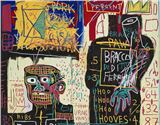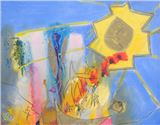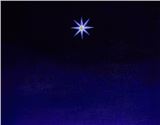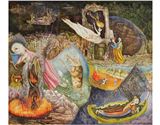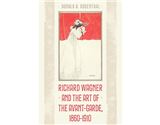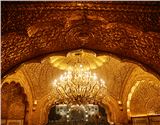Yelena Popova: Made Ground
Cample Line
Thornhill | UKWe are pleased to announce an exhibition of new work by Nottingham-based artist Yelena Popova, entitled Made Ground, which opens on 1 October.
For her exhibition this autumn, Yelena Popova has produced a new group of paintings, for which she has used soil and rock that she collected locally to Cample. A new substantial painting installation, it continues and extends a wider body of work that Yelena calls ‘post-petrochemical paintings’, which she began in 2017 during a residency at Girton College, Cambridge, where she worked with gathered materials and natural pigments for the first time. Installed by Yelena in our upstairs space, these new paintings are to date her most sustained exploration of a place through soil, stone, pigment, gesture and colour.
Made Ground, the exhibition’s title, is the term used to refer to land where natural and undisturbed soils have largely been replaced by man-made or artificial materials. In developing her work for Cample, Yelena has drawn upon her interest in the relationship between geological depository and the kinds of artificial deposits or changes to land surface that are a legacy of local industries such as mining, particularly in agricultural landscapes such as Dumfries & Galloway’s. Mining for materials and mineral resources has happened across the region over centuries and while some remnants of this industrial activity are evident on the land and more obviously so in the built environment, other traces remain hidden from view underground in the soil.
An interest in land use, in our industrial activities and heritage is often central to Yelena’s work. Whilst at Cample, she visited several former local sandstone quarries whose faces, for all their subsequent reclamation by natural forces, continue to expose registers of deep time alongside more recent human histories of extraction. A large ornamental carved sandstone fruit bowl in the grounds of nearby Drumlanrig Castle, overgrown with moss, fascinated her for the way in which the moss will slowly turn the stone back into earth. Walking in the area, by the river, she was drawn to an iron-rich rock, which ‘bled’ a deep terracotta pigment. The landscape resonated deeply for the artist in remembering familiar experiences of being by rivers and forests as a child growing up in the Urals.
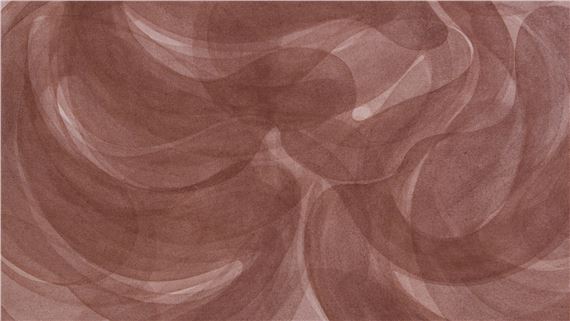
We are pleased to announce an exhibition of new work by Nottingham-based artist Yelena Popova, entitled Made Ground, which opens on 1 October.
For her exhibition this autumn, Yelena Popova has produced a new group of paintings, for which she has used soil and rock that she collected locally to Cample. A new substantial painting installation, it continues and extends a wider body of work that Yelena calls ‘post-petrochemical paintings’, which she began in 2017 during a residency at Girton College, Cambridge, where she worked with gathered materials and natural pigments for the first time. Installed by Yelena in our upstairs space, these new paintings are to date her most sustained exploration of a place through soil, stone, pigment, gesture and colour.
Made Ground, the exhibition’s title, is the term used to refer to land where natural and undisturbed soils have largely been replaced by man-made or artificial materials. In developing her work for Cample, Yelena has drawn upon her interest in the relationship between geological depository and the kinds of artificial deposits or changes to land surface that are a legacy of local industries such as mining, particularly in agricultural landscapes such as Dumfries & Galloway’s. Mining for materials and mineral resources has happened across the region over centuries and while some remnants of this industrial activity are evident on the land and more obviously so in the built environment, other traces remain hidden from view underground in the soil.
An interest in land use, in our industrial activities and heritage is often central to Yelena’s work. Whilst at Cample, she visited several former local sandstone quarries whose faces, for all their subsequent reclamation by natural forces, continue to expose registers of deep time alongside more recent human histories of extraction. A large ornamental carved sandstone fruit bowl in the grounds of nearby Drumlanrig Castle, overgrown with moss, fascinated her for the way in which the moss will slowly turn the stone back into earth. Walking in the area, by the river, she was drawn to an iron-rich rock, which ‘bled’ a deep terracotta pigment. The landscape resonated deeply for the artist in remembering familiar experiences of being by rivers and forests as a child growing up in the Urals.

